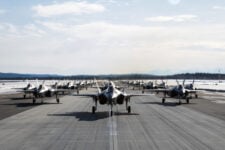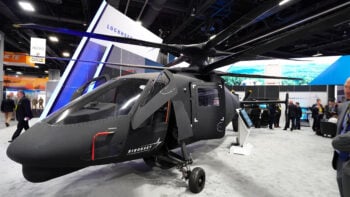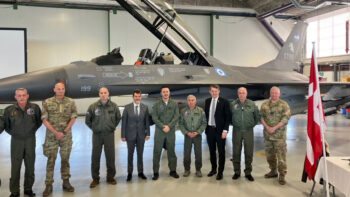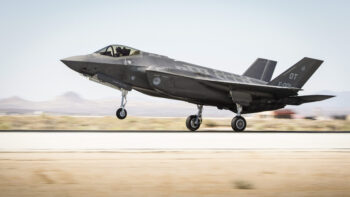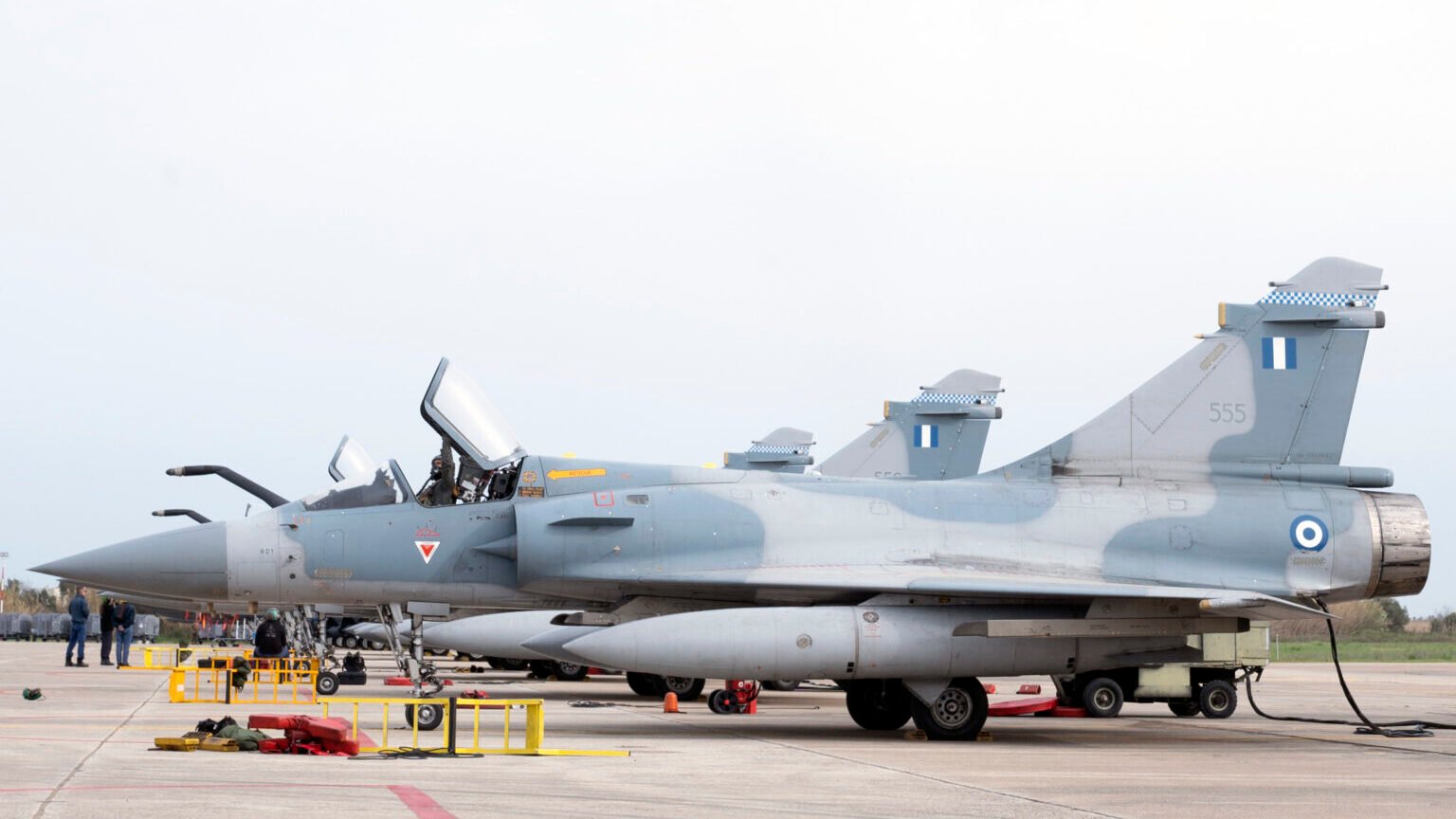
Hellenic Air Force aircraft share a ramp with the U.S. F-15E Strike Eagle during INIOCHOS 22 at Andravida Air Base, Greece, April 4, 2022. (US Air Force/Staff Sgt. Alexandra M. Longfellow)
WASHINGTON: The tables have turned for regional rivals Greece and Turkey in the realm of fighter jet acquisition plans, with Greece headed for a buy of the Lockheed Martin F-35 just three years after Turkey was kicked out of the Joint Strike Fighter program.
Greek Prime Minister Kyriakos Mitsotakis told reporters on June 30 that the country had submitted a letter of request “in recent days” to the US government for a squadron of 20 F-35s, with options to buy an additional squadron, the Associated Press reported.
The Greek announcement came just a day after President Joe Biden said that the United States “should sell” F-16s to Turkey — a statement that was heralded as a breakthrough after Turkey’s purchase of the Russian S-400 air defense system in 2019 stymied US arms sales to Turkey and got it booted from the F-35 program.
Three experts who spoke to Breaking Defense say Greece’s purchase of the F-35 is very likely to be approved, but it could further drive a wedge between the already strained relationship of the United States and Turkey.
“Given the strategic situation in the eastern Mediterranean, a Greek F-35 purchase is inevitable, particularly with the [Hellenic Air Force’s] aging fleet,” said Richard Aboulafia, managing director with Aerodynamic Advisory. “Despite economic challenges, Greece has prioritized a high level of defense spending. The only challenge is availability, given the limited F-35 production ramp.”
An F-35 sale to Greece could inflame Ankara, where there is mounting rhetoric that the United States is using Greece as a pawn to control Turkey and concerns about the deepening relationship between the two nations, said Nicholas Danforth, senior visiting fellow at the Hellenic Foundation for European and Foreign Policy. But that might not be enough to dissuade US policy makers from approving the sale, he added.
“Historically, the United States has placed a huge priority on avoiding conflict between NATO allies in the eastern Mediterranean. In the past, that meant trying to maintain a very balanced position between Greece and Turkey,” Danforth said.
“In time, as frustration with Turkey has mounted, it’s become clear to people in Washington that the real threat in the region is Turkey’s provocative behavior. There’s been a declining concern with whether or not improved cooperation with Greece will antagonize Turkey. I see a greater growing conviction that the relationship with Turkey is a lost cause and that US foreign policy has to do the best it can within that reality.”
Meanwhile, Athens believes that the Turkish threat is real, and that air superiority is critical for countering that threat, Danforth said. “Greece is already convinced that Turkish hostility [and] Turkey’s malign intentions are baked in and as a result are probably less worried about particular steps they take further aggravating Ankara.”
RELATED: Turkey tests Russian S-400 as tensions with Greece, NATO spike
A senior Turkish official said the US government didn’t bring up the sale of F-35s to Greece in its recent engagements with Ankara. The official added his belief that Washington would maintain the diplomatic and military balance between Turkey and Greece and would take into account possible instability such sales could trigger in the region. “This is why we believe Turkey’s F-16 request would be fulfilled,” the official said.
The official added that Turkish military experts believe that the F-16 deal would put Turkey on par with the current Greek military — or even give air superiority to Ankara. But if Greece were to get the F-35, it would put pressure on Turkey’s homegrown TF-X project to be successful as a way of balancing capabilities.
Said the Turkish official: “We would of course criticize the US government if they give F-35s to Athens. Not only would it change the military balance, but also because they didn’t supply the same system to us.”
No one would go on the record among current Turkish officials to discuss the potential F-35 sale, but there is a long line of concerns from retired generals against such a deal. For instance, retired Brig. Gen. Nejat Eslen proposed deploying the S-400 against the Greek F-35s in a 2020 interview to Russian state media.
Asked whether Greece actually has a military need for the F-35 or just wants to get one over on Ankara, Jim Townsend, a former US deputy assistant secretary of defense for European and NATO policy, said, “It’s both. It is definitely both.”
“You need the political hook to get the money, and the military is more than happy to push for it. They probably think the Turks eventually come back to F-35, but the Greeks want to say ‘we’ve already been there and we’ll have the leg upon the Turks because they’ll only have F-16s, and we’ll be in the next generation.’ It’s national pride, not necessarily meeting a specific NATO force goal,” he said.
It’s possible that a Greek F-35 deal could put pressure on Turkey to take steps that would allow it to enter back into the F-35 program, said Townsend, now with the Center for a New American Security. However, “I don’t think the Turks feel threatened by the Greeks,” he added. “The Turks worry more about the PKK.”
While it’s possible that Turkey could seek to throw a wrench into an F-35 sale to Greece, the United States could retaliate against Ankara by blocking Turkey’s F-16 buy, Townsend said. “We have some leverage. It’s rare to have leverage over the Turks and I think F-16 is our main leverage in a lot of ways.”
Euros And Sense
While the experts agreed that the US government is likely to approve the sale, one lingering question yet to be answered is how Greece will ultimately pay for the F-35. The combined forces of the COVID-19 pandemic and war between Russia and Ukraine have sent the global economy reeling, with nations in Europe and elsewhere dealing with surging gas prices, a food shortage, and higher costs due to supply scarcity.
With a unit cost of at least $78 million per F-35A conventional takeoff and landing model — a figure that is expected to increase due to supply chain pressures — and notoriously expensive operations and maintenance costs, paying for multiple F-35 squadrons could be a challenge for Greece even in the best of times. However, Greece’s economic system has only recently gotten back on its feet after the 2008 financial crisis spurred a series of bailouts.
Ultimately, the country could opt to cut its planned buy if it becomes too costly or “get a scaled down version” of the plane “like buying a car without hubcaps,” said Townsend.
“Who knows how they eventually afford it? They don’t seem to be worried about borrowing, as a rule,” he said. “I think what they do is they make buying armaments a top priority because they feel this threat from Turkey, but its also national pride and the ability to show the Turks they can’t take the Greeks for granted. Their economy has gone through issues with debt, so whether they could buy as many F-35s as they plan to or buy them at all is a good question.”
Aboulafia said that Greece could also seek out used planes to try to offset the initial costs of acquiring the F-35. However, that decision could result in higher sustainment costs, as it is more expensive to maintain older, early-model aircraft that may not have been updated with the latest software and hardware.
Ragip Soylu in Turkey contributed to this report.












